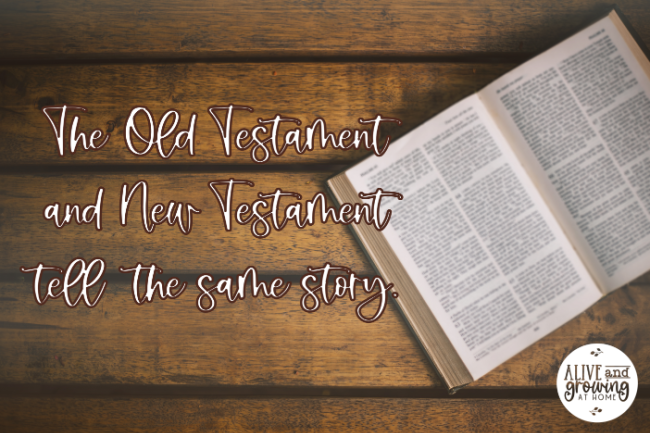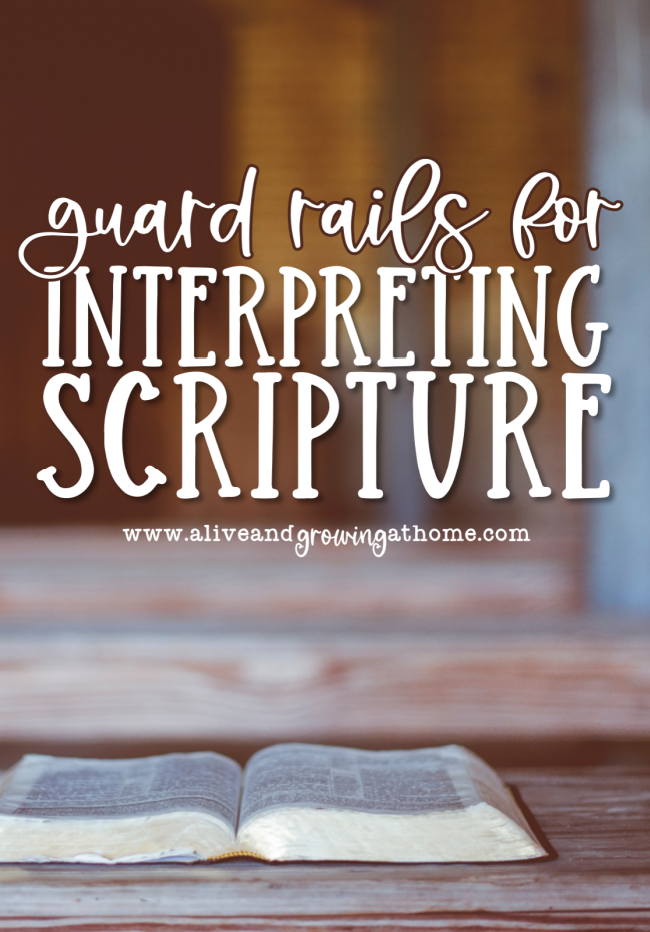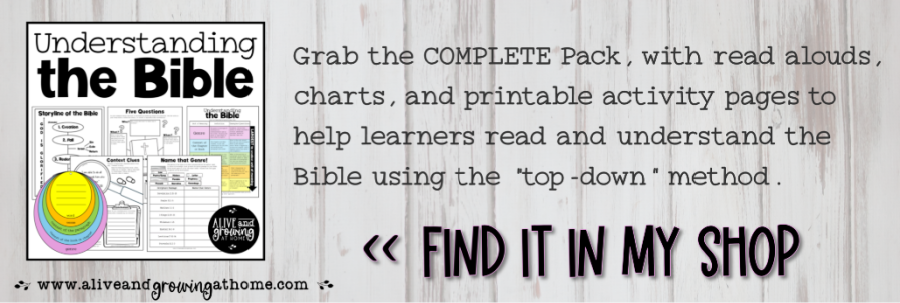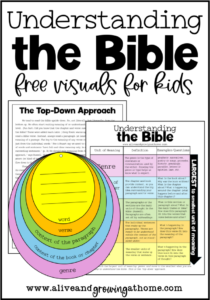Let’s talk about some guard rails that are good to have up for interpreting Scripture.
Have you ever had a conversation about Revelation in which someone claimed the red dragon in Revelation 13 was most certainly China? After all, China’s color is red and the Chinese culture is fond of dragons, right?
Maybe you’ve even heard someone say that we are all God’s children because after all, the Bible says, “God is love.”
**I am a participant in the Amazon Services LLC Associates Program, an affiliate advertising program designed to provide a means for me to earn fees by linking to Amazon.com and affiliated sites.
My goal isn’t to point out that people who say such things are terrible, horrible, no-good people. After all, we are all fallible. We can all be guilty of making God’s Word say what we want it to say rather than what He actually says. But I believe there are some guard rails we can use to help us properly interpret Scripture.
2 Peter 1:20-21 tells us, “Above all, know this: No prophecy of Scripture comes from the prophet’s own interpretation, because no prophecy ever came by the will of man; instead, men spoke from God as they were carried along by the Holy Spirit.” {CSB, 2017}
According to this verse, I believe we also are not to decide our own interpretation of Scripture. Rather, we should let Scripture interpret itself.
In 1 Corinthians 14, Paul explained to the the people in the church of Corinth that God is not a God of confusion or disorder. Of course, he was speaking in reference to church meetings and the use of speaking in tongues, but this truth holds true of all Scripture.
If something in Scripture seems confusing to us, it was not put in the Bible for that purpose. God is not a God of confusion. And He doesn’t intend for us to haphazardly interpret Scripture in any which-way we’d like either. This only leads to confusion and disorder.
If I could recommend one book about reading, interpreting, and applying God’s Word, it would absolutely be Playing with Fire by Walt Russell. His balanced approach on rightly handling the Word of God is so refreshing.
5 Guard Rails for Interpreting Scripture
Here are five guard rails we can use {and teach our kids to use} to help with interpreting Scripture…to be sure what we understand is more in line with what God really said or meant. If you have other ideas, feel free to share them in the comments below!
1. Find the WHO, WHY, and WHOM.
Dig down to find out WHO wrote it, WHY they wrote it, and to WHOM they were writing. Purpose matters quite a bit.
Just think if it this way. If I was writing a letter {or email} to a college roommate of mine, I might include inside jokes in the letter. Maybe I’d reference something silly or dumb that we did years ago. These stories would be things that she would totally understand without needing to re-explain the joke to her.
It’s the same with the Jewish people, for example. New Testament books written to or read by Jewish believers didn’t always need to include a re-explanation of Jewish stories or symbols. They already had those stories and symbols stored in their memory.
You see this in the book of Jude. Jude was written to believers, many of whom were Jews. They would have been very familiar with the Old Testament. Because of this, Jude gives several Old Testament examples and even appeals to stories from the Apocrypha that they would have known as Jews.
The purpose is part of understanding context. To read more about the importance of context, please visit my article, Don’t Read a Single Bible Verse.
2. If something confuses you, keep reading.
As in the case of the red dragon? Just keep reading. Revelation 13 tells you who the red dragon is. Hint: Read verse 9.
The book of Daniel can be just as confusing to many with all the visions he had. Some refer to Daniel is “Revelation Part 1.” A further reading of Daniel often turns up an explanation of what things are. For example, in chapter 8, Daniel talks about about a ram, goats, and horns. What?!? Keep reading. The last part of Chapter 8 has the explanation.
Again, reading the whole passage can help with interpretation.
3. If you can’t understand or find an interpretation in the passage you’re reading, look for references within the same book of the Bible.
Often times, a writer will use a symbol and then use it again within the same book. If you pick up reading later in the book, you may not realize who or what the symbol is referring to unless you go back and find it earlier in the book.

4. If you can’t find the answer in the same book, look in another book of the Bible.
God’s Word DOES NOT contradict itself. So, if my limited interpretation of something contradicts other passages or the message of the Bible as a whole, the Bible isn’t wrong. I am.
If you’re reading the New Testament, don’t discount the Old Testament. The Old and New Testament tell the same story!
Side story: I was recently looking for more information on a local church. The website clearly stated that the pastor only preaches from the New Testament. What? {I’d love to ask him what does he does with the book of Hebrews.}
5. Appeal to a trusted commentary or person.
I love Blue Letter Bible. {I use their app.} You’ll find free resources to commentaries there. I also have a handful of people in my life that I can go to and ask questions when I’m struggling with something, my dad being one of them.
But I don’t just trust anyone’s advice when it comes to the Bible, especially online.
I look for someone who is 1- more mature, meaning they’ve studied God’s Word and been walking with Him longer than me, 2- is still studying God’s Word regularly, and 3- is walking in light of God’s Word daily.
I grew up trusting that every adult in church was solid and had a high view of Scripture. {The Bible is God-breathed, timeless, accurate, and not subject to one man’s interpretation.} Sadly, I’ve come to understand that there is an over-abundance of false teaching from false teachers who simply aren’t preaching or striving to live in light of God’s Word. These men and women are not my “go-to” for answers, and I pray they won’t be yours either.
6. Sometimes you won’t fully understand it on this side of Heaven…and that’s okay!
There are a few Scripture passages that no matter how much you dig, you may not get to a clear answer on what it means. As a matter of fact, sometimes you’ll ask trusted Bible teachers, and they will disagree. Then, you turn to some solid commenataries, and you find they disagree, too. It seems to get muddier the more you research it. Ugh.
Take heart! You’re in good company. I’m reminded of the passage in Daniel 12 when Daniel asked for understanding, and he was told to seal up the scroll for the end of times. If a prophet of God didn’t understand it all, it’s okay if we don’t either.
If you find that your question and is consuming too much of your time, it may be best to jot it down and move on for now. Because you’ve written it down, you can come back to it at a later time.
You May Also Enjoy:
Enjoy God’s Word!
~Becky











Leave a Reply